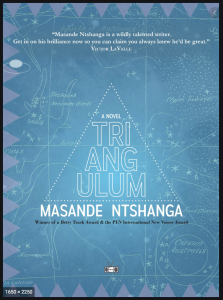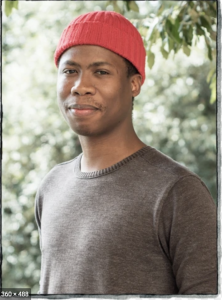by KEVIN GALLIN

Masande Ntshanga, Triangulum (Two Dollar Radio, 2019), pp. 367
This review originally appeared in the Spring 2020 print issue of Carolina Quarterly.
There’s an odd passage about 100 pages into Masande Ntshanga’s Triangulum in which a newly introduced character, Rohan, describes to the unnamed protagonist the plot of the deeply weird 1993 Super Nintendo game The Legend of Zelda: Link’s Awakening: “It all starts with a shipwreck… There’s a storm and Link, the lead character, washes onto an island called Koholint.” But “the best part” is that “Koholint Island doesn’t exist. It’s all in Link’s dream.” After “about 30 damn hours of screen time,” Rohan raves, the player realizes that the whole plot is imagined – a strange, delirious adventure creakily assembled in Link’s mind as the trusty Hylian hero clings for life, spread across a log floating in the ocean, his iconic pointy hat creating a peak against the backdrop of the waves. I remember well this revelation from my own childhood. I agree with Rohan. It was the best part.
That’s the trick of Ntshanga’s novel. By the end, we realize that everything we think we know for sure about the novel’s plot has been, in some way, dreamt. It has taken the work of our own imagination to take what we are given and infer what has happened in the interstices. This is in some ways a pivot from Ntshanga’s first novel, The Reactive (2016), which presents a searing and complex portrayal of the consequences of South Africa’s governmental policies for dealing with the AIDS epidemic. Here, in Triangulum, Ntshanga maintains his control of formal innovation, but verges towards the speculative to supersede the bounds of strict realism.
The novel opens as a derelict found-document, compiled by the fictional Hugo Award winning novelist Dr. Naomi Buthelezi at the behest of her astronomer friend Dr. Joseph Hessler. “Two months ago… we received an unmarked package at our front desk,” he tells her, and asks for her help in reconstructing a narrative from “a written record in the form of a memoir,” a “work of auto-fiction,” and “a set of digital recordings, the contents of which reveal the sender as having undergone a series of hypnotic age regression treatments.” Hidden within this mysterious package, the astronomer reveals, is the impossible: “It predicted the present.” The hurriedly packaged pages documented the orchestration of a string of eco-terrorist attacks roiling Cape Town before they occurred. What could have been an oddity, or the product of a distressed mind, is now considered a threat.
This frenetic world-building at the outset offers the promise, inherent in much of the science fiction that I’ve read and loved, that everything will snap together. This is the power of world-building as such—the subtle click when the unfamiliar is explained, or when an apparent incongruity is revealed to be an organizational principle of the fictional world we temporarily inhabit. As a reader, I was primed to think that all of the confusion in the novel’s opening pages would get sorted, if I trusted Dr. Buthelezi (and therefore Ntshanga) as Hessler had. And yet, both the astronomer and the novelist swiftly disappear from the narrative. Buthelezi remains only by implication, as the hand giving editorial shape to the various headings and framings of each chapter (Kessler is gone entirely). There is no snappy coda at the end to bring it full circle. While many of the small details throughout the novel do find eventual narrative purchase, far more mysteries strand out over the novel’s pages, wispily intersecting and promising further resolution without granting it.
While focused tightly on the unnamed narrator, Triangulum follows a sort of dream logic where genres smash up against the shore of one another. At various stages, recognizable forms emerge for a time. It opens with a kids-on-bikes detective story, with echoes of Stranger Things––long before the explosions, young girls are disappearing from the narrator’s home town, and the narrator and her friends feel compelled to seek out answers. It swirls into hazy, druggy bildung, with the narrator trying to map her sexuality alongside and with her two friends––a love triangle, subtly invoking the title. Under it all, the terse political stakes of post-apartheid South Africa churn, inflecting the narrator’s relationship with her father and her community at large. And if this were not enough, the novel tips into gritty, Don DeLillo-esque meditation on the nature of art as the narrator falls in with crunchy bohemians cum eco-terrorists, and ends, more or less, with near-future dystopia, where our very memories can be extracted, monetized, weaponized. Did I mention the narrator’s mother has gone missing, and that both she and the narrator may have been contacted, and possibly genetically enhanced, by aliens?
This may all seem far too spoilery for a review, but I promise that this novel is basically immune to spoiling. The plot matters far less than the experience of piecing it together. Where there were timeslips between narration, I found my brain whirring to bring events into sequence with one another. When the framing genres seemed to shift, I grasped at my experience to help map what kind of story, what particular logic, the novel was leaning on in the moment. The edges of the vignettes that make up the whole of Triangulum only began to bleed into each other once I learned to adopt the perspective of Dr. Buthelezi, struggling to make sense of something that seems impossible. It seems too cute by half to suggest that the key to Triangulum is the process of triangulation, but it’s hard to avoid. That’s precisely what I felt myself doing – plotting tentative coordinates in hopes of mapping some definable center. This feeling is made quite literal when, near the novel’s conclusion, the narrator meets up with her friends again, this time in search of her mother. “I have a plan,” one of them promises. “[I]f we form another triangle… and then superimpose it over town, we can project another direct route.” As his strategy emerges, they’re left without a solution, but still:
“It’s a starting point,” he says, “Meaning we should investigate each angle of the triangle.”
Why? “Looking for clues.”
Where? “In the dark.”
I expected to find myself in pursuit of the extraterrestrial intelligence hinted at by the cover art – an impressionistic diagram of the constellations visible from the southern hemisphere – and the reference to “a puzzling book on UFOs” cited in the blurb on the cover’s reverse. But, as readers of Ntshanga’s novel, we are pressed into service with the narrator and her friends, drawn to the emotional core left vacant by the disappearance of the narrator’s mother. These mysteries are never resolved, not fully. But by the final pages, I felt I had a plan, a conjectural logic, for understanding the narrator and by extension the novel. It is perhaps improbable for so much to hang on the lone narrator, but that improbability is superseded by the deftness with which Ntshanga draws her edges. What is consistent about the unnamed narrator is less a string of autobiographical data that trails her, and more the cool, detached, curious attitude towards the swell of intrigue that she consistently finds herself in while otherwise remaining only loosely invested. For all the time we spend in her narration, the solutions to the central mysteries are always just out of view; an infinitely-regressing field that can only be solved provisionally, and even then only by imagining the various shapes the story could, or perhaps should, take.

This is the novel’s greatest strength, but also the source of its frustrations. There are points, especially when the text flips between memory-regression sessions and memoir, where it becomes confusing – to the point of distracting – to keep track of just exactly where the narrator is and what she’s doing. When the novel intercuts itself with new moments in the narrator’s life, it is a welcome breath of fresh air. When it cuts between two moments which seem altogether very similar, coupled with the narrator’s own reflections back to periods from before the events of the novel, it can prove frustrating in its refusal to cohere. It would take a thorough re-reading to tell if everything that is set up really pays off, but I question whether that’s even the right thing to ask. Instead, I think the lack of pay-off is the point.
The best novels not only show us new worlds but teach us new ways of thinking. Triangulum does just that. It is less important to figure out precisely what is going on at any given moment; rather, we simply need to pay attention. We take what we might know about the narrator and triangulate it with our mental maps of genre, working within those shapes and with the clues that we are given. There’s a tension there, between wanting to grasp entirely what “happens” in the novel and acknowledging our inability to do so. Whether it is a sign of Ntshanga’s craftsmanship or an unsatisfying sloppiness will come down to you, the reader. You can perhaps map the coordinates of where I land. Ultimately, like a magic eye puzzle, the fullness of Ntshanga’s accomplishment only comes into focus if we allow our suspicious attention to go a bit slack. The harder we look, the less we know for sure. We can only carve a space around what it is and find joy and pleasure in seeing how the image shifts into and out of focus, knowing that it will disappear as soon as the delicate balance is lost.
At the end of the day, all novels are a sort of dream, and Triangulum is no exception. Our imagination, dutifully trained by a life of reading other novels, defines the limits of what we might expect and fills in what isn’t there. We also know that finishing novels is a sort of waking up – who hasn’t felt a bit adrift after finishing a captivating work of fiction? Like Rohan says of Link’s Awakening, isn’t that the best part?

